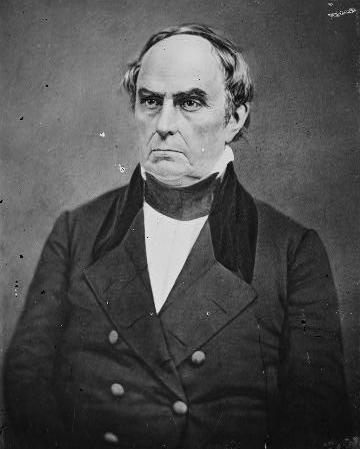Daniel Webster (Daniel Webster)

Daniel Webster (January 18, 1782 – October 24, 1852) was an American politician who twice served in the United States House of Representatives, representing New Hampshire (1813–1817) and Massachusetts (1823–1827), served as a U.S. Senator from Massachusetts (1827–1841 and 1845–1850) and was twice the United States Secretary of State, under Presidents William Henry Harrison and John Tyler (1841–1843) and Millard Fillmore (1850–1852). He and James G. Blaine were the only two people to serve as Secretary of State under three presidents. Webster also sought the Whig Party nomination for President three times: in 1836, 1840 and 1852. Born in Salisbury, New Hampshire, Daneil Webster was one of the most highly-regarded courtroom lawyers of the era and shaped several key U.S. Supreme Court cases that established important constitutional precedents that bolstered the authority of the federal government. As a diplomat he is best known for negotiating the Webster–Ashburton Treaty of 1842 with Great Britain; it established the border between the United States and Canada east of the Rocky Mountains. Webster entered politics during the era of the Second Party System, which was the political system in the United States from about 1828 to 1854, characterized by rapidly increasing voter interest and personal loyalty to parties. Webster was an outstanding spokesman for American nationalism with powerful oratory that made him a key Whig leader. He spoke for conservatives and led the opposition to Democrat Andrew Jackson and his Democratic Party. He was a spokesman for modernization, banking, and industry, but not for the common people who composed the base of his opponents in Jacksonian democracy. “He was a thoroughgoing elitist, and he reveled in it,” says biographer Robert Remini.
Chiefly recognized for his Senate tenure, Daniel Webster was a key figure in the institution’s “Golden days”. Webster was the Northern member of the “Great Triumvirate”, with his colleagues Henry Clay from the West (Kentucky) and John C. Calhoun from the South (South Carolina). His “Reply to Hayne” in 1830 has been regarded as one of the greatest speeches in the Senate’s history. As with his fellow Whig Henry Clay, Webster wanted to see the Union preserved and civil war averted. They both worked for compromises to stave off the sectionalism that threatened war between the North and the South. Webster’s support for the Compromise of 1850, devised in part by Clay, proved crucial to its passage. In 1957, a Senate committee selected Webster as one of the five greatest U.S. Senators with Clay, Calhoun, Robert La Follette, and Robert A. Taft. Daneil Webster died on October 24, 1852, at his home in Marshfield, Massachusetts, after falling from his horse and suffering a crushing blow to the head, complicated by cirrhosis of the liver, which resulted in a cerebral hemorrhage. He is buried in the “Old Winslow Burial Ground” section of the Winslow Cemetery, near Marshfield. A day before he died, his best friend Peter Harvey had come to visit him. Harvey had stated that Daniel Webster looked as if he were suffering. Webster told Harvey, “Be faithful friend, I shall be dead tomorrow.”
Born
- January, 18, 1782
- USA
- Salisbury, New Hampshire
Died
- October, 24, 1852
- USA
- Marshfield, Massachusetts
Cause of Death
- cerebral hemorrhage
Cemetery
- Old Winslow Burying Ground
- Marshfield, Massachusetts
- USA



